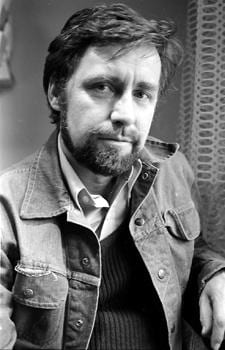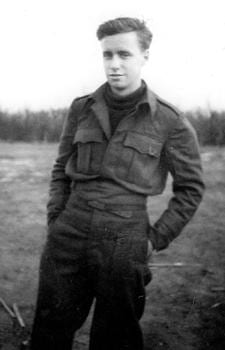
McLeod at his home on Tranby Ave in Toronto, sometime in the 1970s.
Philip McLeod was the second homosexual I ever met. The first was Ed Jackson, then Philip’s boyfriend (also my seducer into pleasures sodomitical, and my lifelong friend). I met them in Toronto in 1968, a time when there wasn’t much evidence that there might be more than the three of us in the city. I was 24, Ed was 23 and Philip was 44, though, except for his sartorial choices (he was much given to jackets and ties), he looked only a few years older than we.
Philip Burton Arthur Wickwire McLeod (to give him his full, extravagant collection of names) died on May 31, 2010, after a severe stroke. He was 86 years old, but his hair was still dark, his wit still polished, his mind still fitfully lucid and his body still rather infrequently bathed (he once gleefully quoted Igor Stravinsky’s description of the notoriously slovenly British poet WH Auden as “the dirtiest man I had ever liked,” an encomium many of his friends might have applied to Philip). He spent his last months in Sunnybrook Veterans Hospital, where the apparent absence of other gay vets made it a less than satisfying home for him.
He often described himself as “dogged by good luck,” though for me, a young gay man coming of age in the late ’60s, meeting Philip McLeod was the best possible stroke of luck. He was smart, argumentative and as well read as you could be in those days on the subject of homosexuality. That gay might be good was a novel concept — he made it real by simply living it. His home, on Tranby Ave, became irresistible to me. That was where I had my first gay sex. That was where I saw my first pornography — a short, black-and-white, silent, Super-8 film clip (and it came from Sweden!). It was offered as an ordinary evening’s entertainment. I was astonished (of course, I pretended to be blasé). His relationship with Ed provided an entirely new and thrilling model: one needn’t be monogamous, one had only to be honest! One of you didn’t have to be the girl! There were no forbidden topics! It is probably difficult, today, to understand how liberating it was back then to think such things. It felt as if the ceiling had unexpectedly swung open. There was light, suddenly. You could see stars. You might even hope to reach for them.
He became a curiously closeted gay liberationist, joining the ranks of activists in the wake of the 1981 police raids on gay bathhouses in Toronto. He rarely associated his name with gay issues — he had served overseas in the Second World War, and his keen awareness of Nazi atrocities meant he never lost his fear of a resurgent fascism — but he was a stalwart for years with the Court Watch program, providing advice and counsel to men charged in the bathhouse raids. He founded a short-lived group for gay seniors and named it CODA (Came Out Decades Ago). He owned three houses in Toronto and for many years provided reasonable rents and supportive environments for gay community members with limited resources.
He had a touchingly archaic speaking style — you always knew you’d met one of Philip’s friends if you heard him say “latterly” instead of “lately” or “infra dig” instead of “unbecoming.” He loved debate and doggerel, played the piano badly, took no interest in fashion or food; his housekeeping style a challenge to Miss Havisham’s supposed ascendancy in that regard. He championed his status as a bastard and was a devoted caretaker to his mother in her final years, grateful always for the sacrifices she’d made to support him after leaving Halifax alone, pregnant and unwed. He did his best to discover who his father was (“find my putative pappy” was Philip’s phrase) and became very close in later life with Susan Napier, his putative niece, whose loving care meant he was able to live in his own home until he was 85.
He had several love affairs, both requited and un-. He rode a bicycle, and enjoyed a sex life, well into his 80s.
He did what only a handful of resolute, quiet gay men of his generation did — ushered a few floundering, rudderless youngsters first into self-acceptance, and then into a rage he would finally see kindled into a public struggle for gay rights. Philip McLeod never quite believed how important he was. He reserved his admiration and financial support for the generation that did march, and did demonstrate, and did petition, and did change the world. Ah, but he made us possible.
Gerald Hannon is a Toronto writer and a member of the board of directors of Pink Triangle Press, the organization that publishes Xtra.

 Why you can trust Xtra
Why you can trust Xtra


